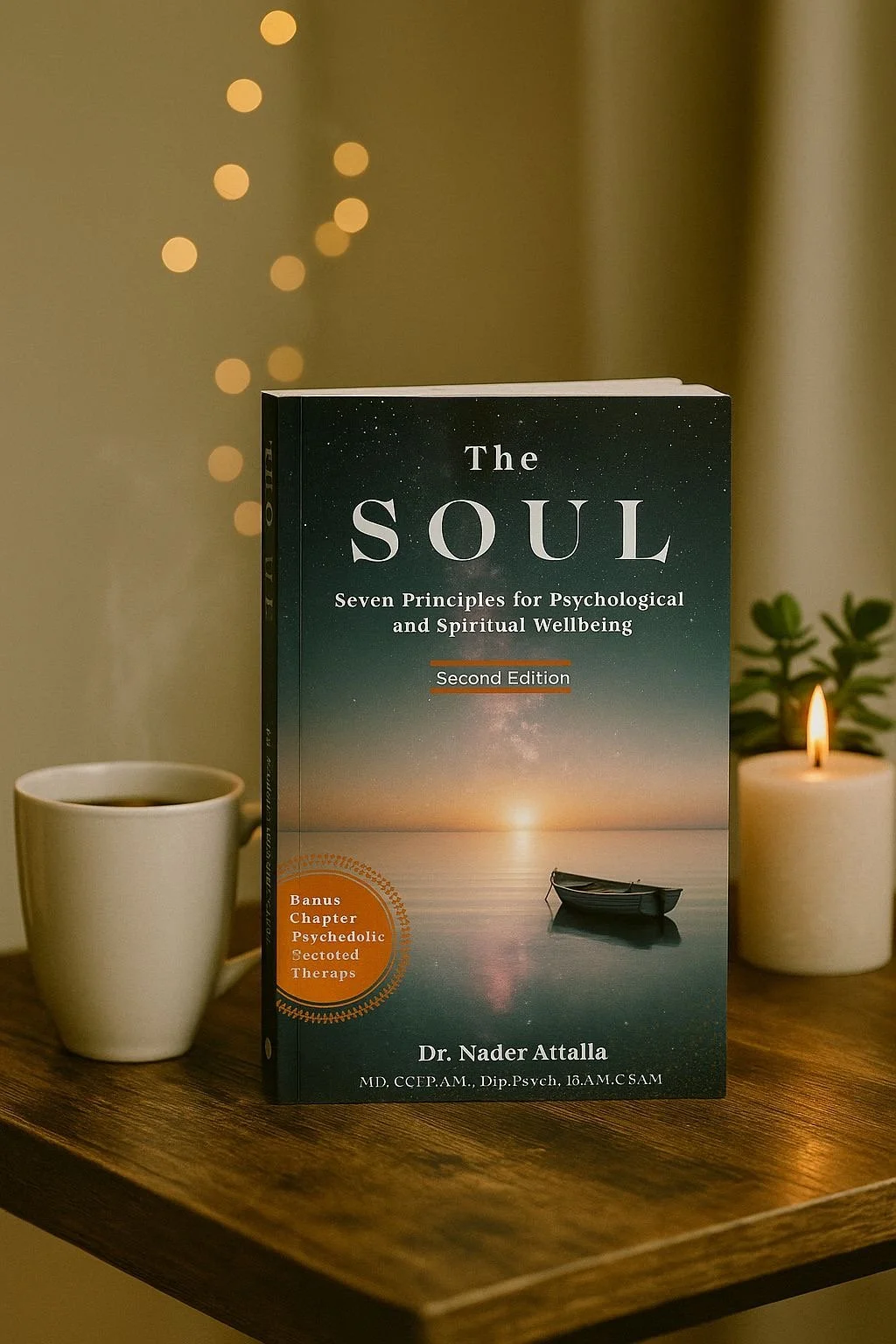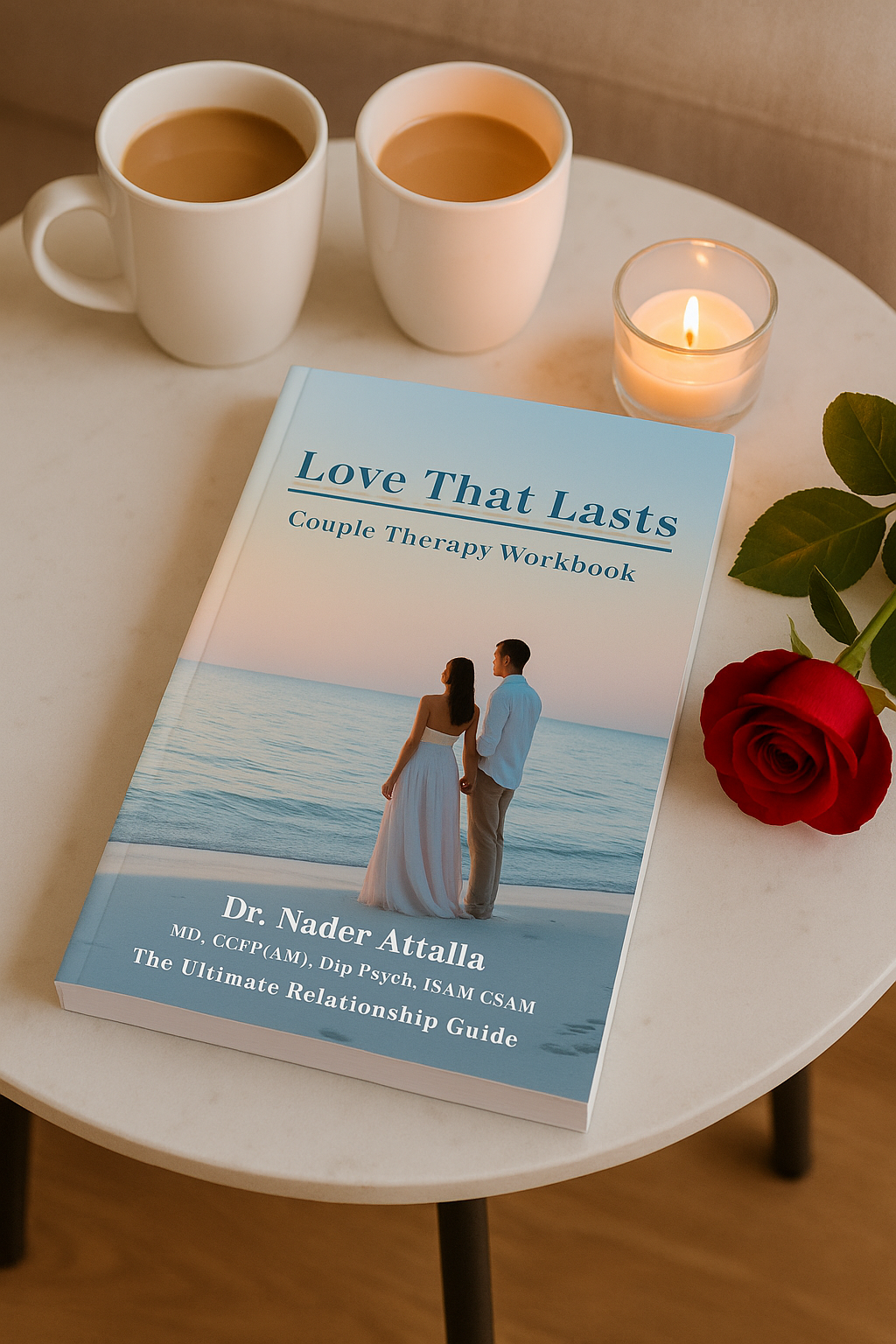Now Available On Amazon - English & Arabic Version:
Dr. Attalla’s ‘The Soul: Seven Principles for Psychological and Spiritual Wellbeing’
What’s it about?
Dr. Nader Attalla presents a “whole-person approach” to overall wellbeing and explores the spiritual, alongside the biological, psychological, and social factors that define and impact our daily lives and functioning. His book highlights the value and significant benefits of spiritual understanding, as a roadmap to our innate capacity for happiness, success, health, love, inner peace, and creativity.
As a family physician, addiction medicine specialist and psychiatrist, Dr. Attalla lays out a practical and tangible guide to help readers obtain optimal mental health through seven principles. These same principles have been taught in numerous patient seminars and groups run by Dr. Attalla and his Soul Team, with the hope of reaching and helping others.
For those undergoing daily stress, depression, anxiety, addiction, eating and personality disorders, trauma, anger, and sleep issues, this book is for you.
Who will benefit from this book?
Medical students, residents, and physicians interested in discovering more about spirituality from a medical perspective.
Psychotherapists and counsellors who wish to include spirituality with other psychological interventions such as dialectical behavioral therapy and cognitive behavioral therapy.
Patients struggling with depression, anxiety, personality disorders, and addiction issues.
Twelve-step-program attendees who want to learn more about the recovery process.
Parents wanting to fulfil their children’s spiritual needs.
Youth searching for meaning in life and those living through existential crises.
Atheists seeking spiritual connection without involvement in organized religions and dogmas.
What are the seven principles?
Non-Attachment
Non-Judgment
Acceptance
Unconditional Love
Powerlessness
Gratitude
Hope
What are people saying about it:
“Knowing the seven principles is like knowing the truth about happiness. It is the key which can free you from many limitations, boundaries, and conflicts…No matter where you are in life, you will find something meaningful and of great value by practicing these principles. I have seen profound transformations when my patients, colleagues, and I began applying these principles in our daily lives. They are simple yet powerful. Devote yourself to them and transform yourself and your relationships with loved ones and everyone around you.”
Mehwish Hanif, MD, CCFP
Family Physician
Clinical Lecturer | Department of Family Medicine, University of Calgary
Cofounder of the Soul Program
“In my clinical practice, I have often highlighted Non-Attachment (“be OK with or without”), and Acceptance (“God, grant me the serenity to accept the things I cannot change, courage to change the things I can, and wisdom to know the difference”) for my mental-health patients. In retrospect, I believe it’s because these two principles resonated with me personally and comforted me greatly in challenging times.
Experiencing the COVID-19 pandemic, we confirmed, or, for the first time, realized the fragility of our society and our definition of normalcy. We encountered many instances of powerlessness as we foraged the unknown territory of overwhelming instability (including ever-changing policy, by-laws, further social isolation, and even loss of our loved ones). In navigating these uncertain times, we experienced degrees of frustration, devastation, and hopelessness. In such times, I felt that the seven principles, especially the two mentioned above, were solid foundations that gave me the energy to carry on with hope.
Dr. TaeEun Ahn, MSc, MD, CCFP
Family Physician
Clinical Lecturer | Department of Family Medicine, University of Calgary
Cofounder of the Soul Program
Dr. Nader Attalla’s seven principles utilizes a multi-faith approach to universalize core elements of the human experience. Each principle carefully links to the next to create a roadmap for self-discovery, with the ultimate goal of living as one’s authentic self. By following the principles, one can attain peace and harmony within oneself and with those around them.
Dr. Magdalene Leung, MSc, MD, CCFP
Family Physician
Cofounder of the Soul Program
I have witnessed, first hand, how the principles, taught by Dr. Attalla, have changed patient’s and professionals mindsets and lives. All seven principles are significant and serve us and others well, when used appropriately and applied often. Each one compliments and works harmoniously with the others, to provide balance, purpose and peace in our lives. They are uncomplicated reminders of how to find value in ourselves and nature and leave others better than how we found them.
The ones most impactful to me are Non-Attachment, Acceptance, and Powerlessness.
I love the idea that we will be ok, with or without, in all situations, despite what or who we have or don’t have. This idea that our happiness is not dependent on “things,” but how we choose to embrace life… The principle of Acceptance is also beautiful, in the sense that we believe others, despite their behaviour, are trying their best, with the tools they have and experiences they’ve had. This thinking removes blame and frees us to assume the best of people. Powerlessness is important because, regardless of your perspective on religion or spirituality, you can surrender your burdens to something bigger than yourself, which is humbling and freeing.
Brooklyn Harrington, RSW
Group Co-Facilitator
Cofounder of the Soul Program
It is an honour to contribute to the realization of this book with the information gathered from Dr. Attalla’s seminars about the seven principles. The book offers practical intervention that will serve patients as well as clinicians in integrating spirituality and mental health. It is a great reminder of how to undo our wounded egos and inspire the integration of our highest virtues, such as Unconditional Love, Acceptance, Non-Judgment, Gratitude, Powerlessness, Hope, and Faith. In practicing these spiritual principles, I was personally able to give meaning to my own difficulties…My suffering was an occasion for deep transformation, a movement toward wholeness and inner peace. And in true humility, this is a lifetime path. As a new mother blessed with a child after many years of infertility struggles, these spiritual principles will serve me for the rest of my life. Nobody is exempt from suffering, but we can all make it an occasion to grow.
Rather than simply be given a prescription and diagnosis, we need tools to balance our bio-psycho-social and spiritual health. The goal of the therapist is to offer the best conditions so that our true nature can operate. Dr. Nader Attalla is a true doctor of the soul…I am grateful for this book, which gives practical tools to guide us back to wholeness, and for his devotion to the wellbeing of all.
Mélissa Vallières, RN
Love That Lasts: Couple Therapy Workbook
Now Available On Amazon
Discover the Map to a Healthy and Lasting Relationship
Every relationship holds the promise of joy, love, and connection—but it also comes with challenges that can leave couples feeling lost, misunderstood, or disconnected. Whether you are preparing for marriage, entering a new relationship, or hoping to strengthen the bond you already have, this book offers a clear roadmap to help you build a partnership that is both healthy and lasting.
Written by Dr. Nader Attalla, family physician, psychotherapist, and assistant professor, this book draws from years of clinical experience, group therapy work, and counseling sessions with couples at different stages of their journey. Dr. Attalla combines scientific insights, therapeutic techniques, and real-life examples to provide practical advice that you can immediately apply in your own relationship.
This is not just another book filled with theory. It is a hands-on guide, rich with exercises, reflections, and step-by-step strategies that will help you and your partner:
✅ Improve communication and truly understand each other
✅ Build emotional intimacy and deeper trust
✅ Navigate conflicts in a healthy, constructive way
✅ Heal from past hurts and create new patterns of connection
✅ Strengthen love, gratitude, and joy in daily life
✅ Develop shared values, vision, and long-term commitment
From exploring the principles of acceptance, non-judgment, and gratitude to understanding emotional triggers, forgiveness, and family-of-origin patterns, this book addresses the real issues couples face every day. It serves as both a premarital guide and a relationship workbook, making it the perfect companion for couples of all backgrounds—whether you are just starting out or have been together for years.
You will also find powerful tools inspired by therapeutic practices such as:
Couples exercises that encourage open dialogue and active listening
Reflection questions to uncover hidden beliefs and expectations
Healing activities that help release resentment and rebuild closeness
Practical tips for managing stress, balancing responsibilities, and keeping love alive
📖 Why This Book Is Different:
It blends professional expertise with approachable, relatable advice.
It respects both the emotional depth of relationships and the practical realities couples deal with.
It’s written not just for couples in crisis, but for anyone who wants to protect, strengthen, and celebrate love.
Whether you are looking for marriage preparation, a guide to healthy love and intimacy, or a resource to help you reconnect and rebuild, this book will give you the clarity and confidence to create the relationship you deserve.
💡 Imagine what it would feel like to:
Wake up each day feeling secure and appreciated
Share your thoughts and emotions freely without fear of judgment
Resolve conflicts in a way that brings you closer instead of pushing you apart
Build a future together that reflects both your dreams and your values
That is the promise of a healthy relationship—and this book is your guide.
✨ Don’t wait until challenges become crises. Invest in your relationship today. Whether as a gift for yourself, your partner, or a couple you care about, this book is a practical and heartfelt resource that can transform the way you love and live together.
👉 Ideal for: Couples preparing for marriage, partners in long-term relationships, newlyweds, or anyone seeking practical wisdom for lasting love.
Available on Amazon in both English and Arabic, in Kindle and Paperback editions:
Get your copy on Amazon here:
English: love That Lasts: Couple Therapy Workbook
Arabic: حب يدوم : الدليل الكامل للعلاقات الناجحة
Watch the love That Lasts podcast on YouTube here:
English: Love That Lasts
https://youtube.com/playlist...
Arabic : حب يدوم
https://youtube.com/playlist...
I can’t wait to hear how this book helps you and your partner build a love that truly lasts





